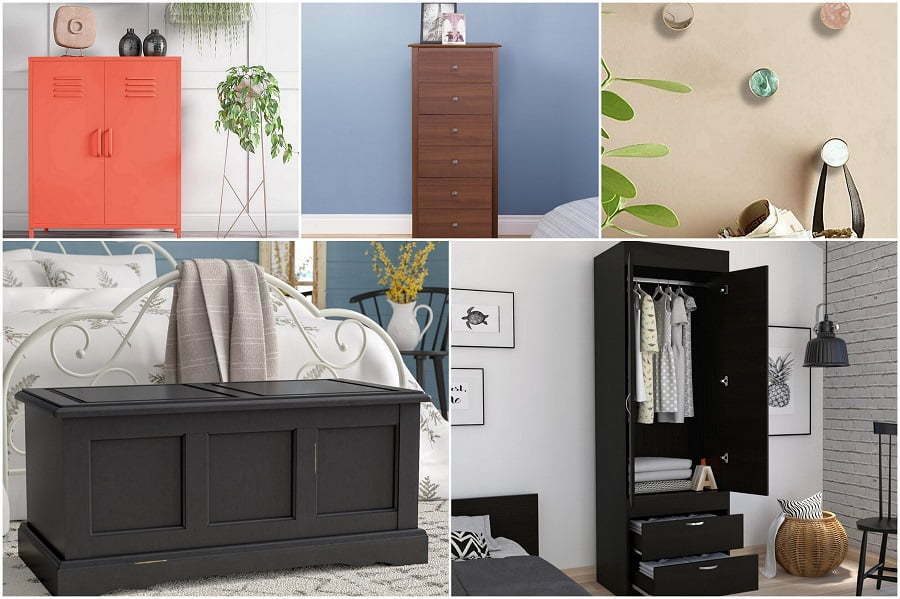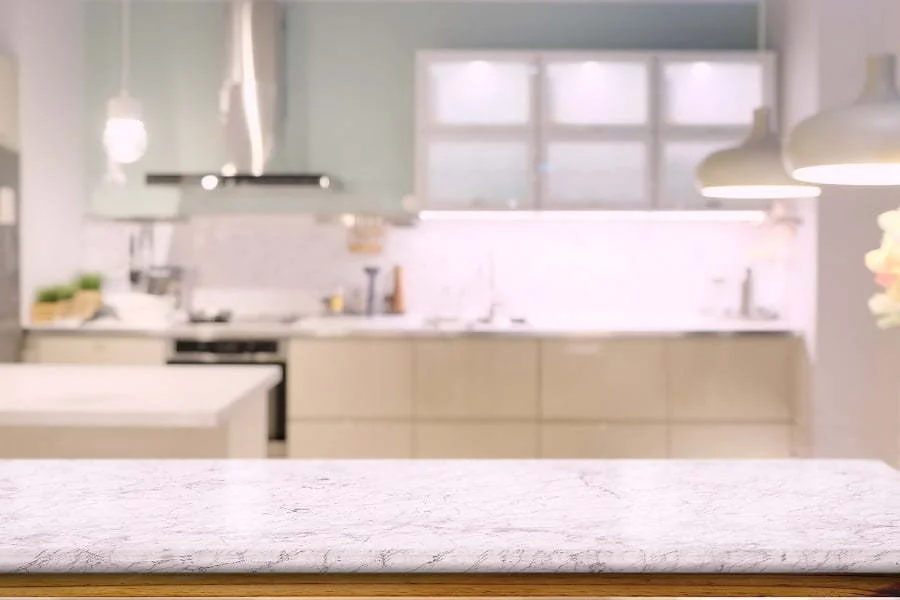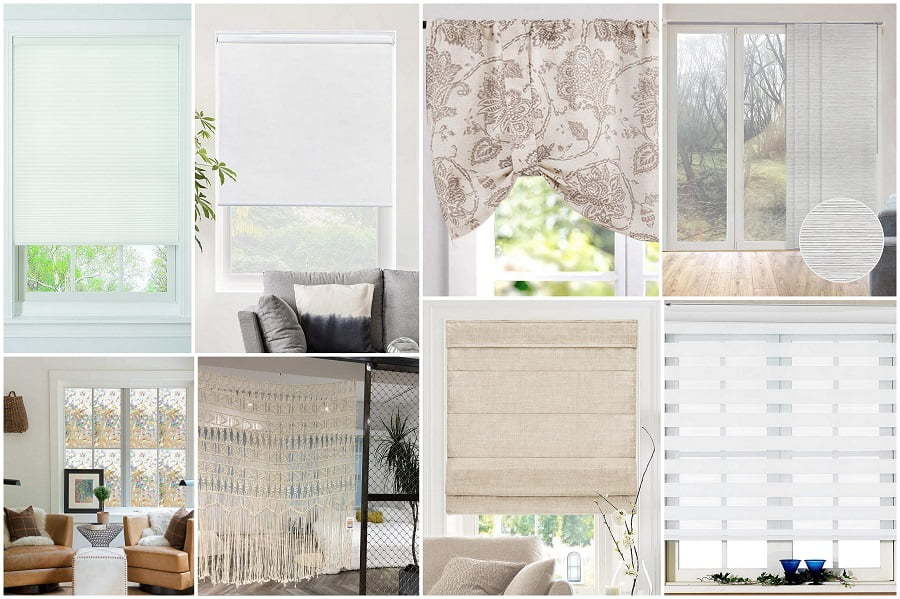Last updated on
Discover budget-friendly alternatives to mulch and their pros and cons. Read on!
I’m always on the lookout for creative and affordable ways to spruce up a space. And one aspect of decorating that often gets overlooked is landscaping.
Mulch is a popular choice for many homeowners when it comes to adding curb appeal and protecting plants from weeds, but did you know there are many other options out there?
In this article, I’ll share 20 mulch alternatives with their advantages and disadvantages so you can find the perfect solution for your garden or outdoor space.
From recycled materials to natural elements, these ideas will elevate your landscaping game and help you save money in the long run.
So let’s dive in!
Grass Clippings
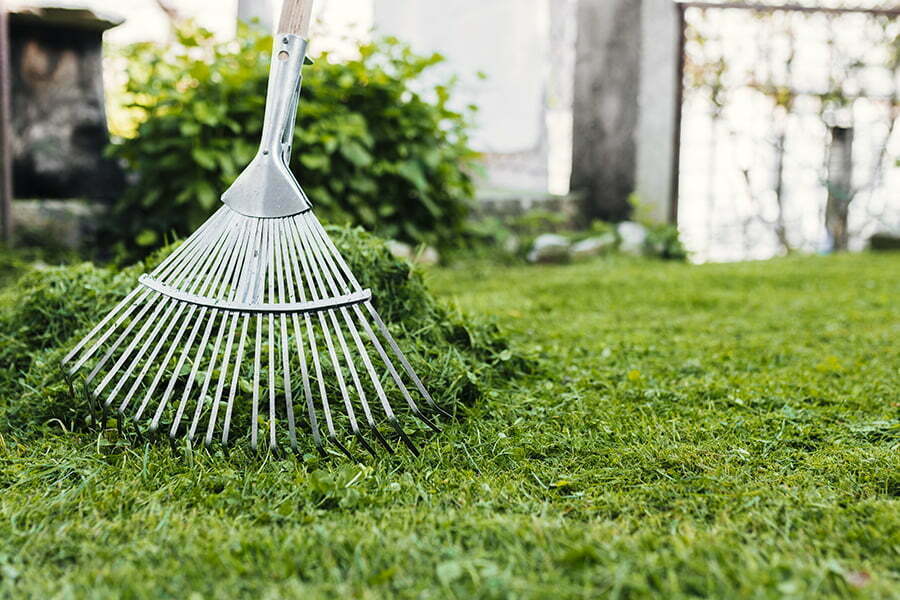
Grass clippings are a readily available mulch alternative that can be obtained for free. They are an excellent source of nitrogen and other nutrients, making them ideal for vegetable gardens and flower beds.
Grass clippings also help to retain moisture in the soil, which reduces the need for watering.
However, there are some disadvantages to using grass clippings as mulch. If the grass has been treated with herbicides or pesticides, those chemicals may end up in your garden soil.
If you use too much grass at once or pile it too deeply around plants’ stems or trunks can cause rotting issues.
To avoid these problems when using grass clipping as a mulch alternative:
- Only use untreated lawn trimmings.
- Allow them to dry out before applying them.
- Spread thin layers no more than 1 inch deep around plants.
Following these tips when using this natural material as a mulching option will ensure that your garden remains healthy while saving money on expensive commercial products!
Leaves
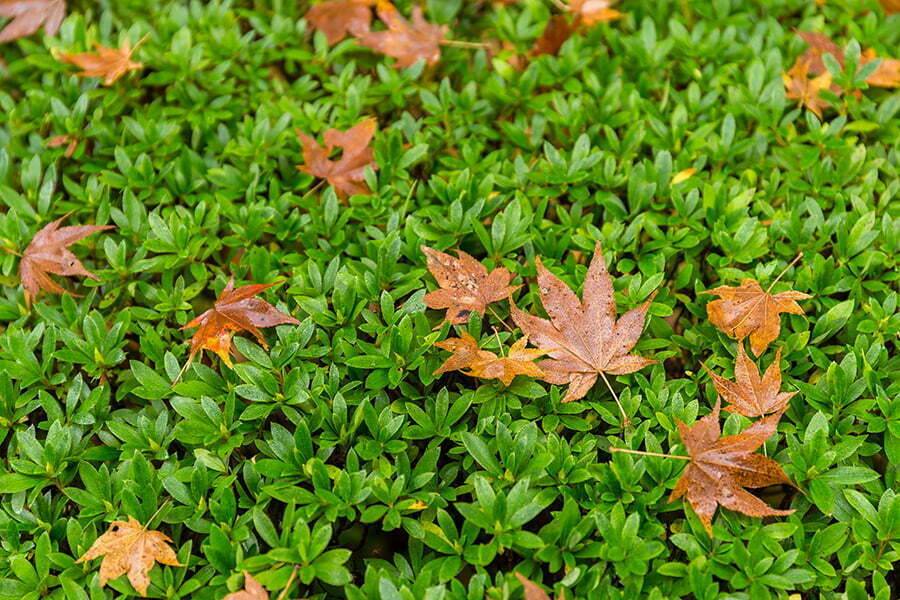
Leaves are a readily available and affordable mulch alternative found in almost any backyard. They provide many benefits to your garden, such as retaining moisture, suppressing weeds, and adding nutrients to the soil as they decompose.
However, there are also some disadvantages to using leaves as mulch. For instance, they may blow away easily if not properly secured or become matted down when wet, preventing water from reaching the soil beneath them.
Certain types of leaves may contain toxins harmful to plants or attract pests like slugs and snails.
To use leaves effectively as mulch for your garden beds or around trees and shrubs you should shred them first with a lawn mower or leaf shredder before spreading them evenly over the desired area at least 2-3 inches deep. This will help prevent matting while allowing air circulation for proper decomposition over time.
Overall using leaves is an excellent way of recycling organic matter into useful nutrients for your plants while saving money on expensive commercial mulches but it’s important to consider their limitations before deciding whether this option is right for you!
Hay Straw
Straw and hay are popular mulch alternatives that have been used for centuries. They are readily available, affordable, and easy to apply.
Straw is the stem of wheat or other cereal grains after the grain has been harvested, while hay is a mixture of grasses and legumes that have been cut and dried for animal feed.
Advantages:
- Straw/hay mulch helps retain moisture in the soil by reducing evaporation from the surface. It also suppresses weed growth by blocking sunlight from reaching weed seeds.
- Straw/hay breaks down slowly, adding organic matter to the soil as it decomposes.
Disadvantages:
One major disadvantage of using straw/hay as a mulch alternative is its tendency to attract rodents such as mice who may use it for nesting material during winter months when food sources become scarce. Also if not properly cleaned before application they can contain unwanted seeds which will sprout into weeds later on causing more work than intended.
Straw/hay can be an effective option for gardeners looking for an affordable way to improve their soil health while suppressing weeds at the same time but care must be taken with proper cleaning before application so you don’t end up with more problems than solutions!
Pine Needles
Pine needles are a popular mulch alternative that can be found in abundance in many areas. They have several advantages, including their ability to repel insects and retain moisture well.
Pine needles also break down slowly, which means they don’t need to be replaced as often as other types of mulch.
However, there are some disadvantages to using pine needles as a mulch alternative. One is that they can become compacted over time, making it difficult for water and air to reach the soil beneath them.
Pine needles may not provide enough nutrients for certain plants or gardens.
Despite these drawbacks, pine needle mulch remains an attractive option for those looking for an affordable and natural way to protect their garden beds from weeds while retaining moisture levels within the soil.
Wood Chips and Bark Nuggets
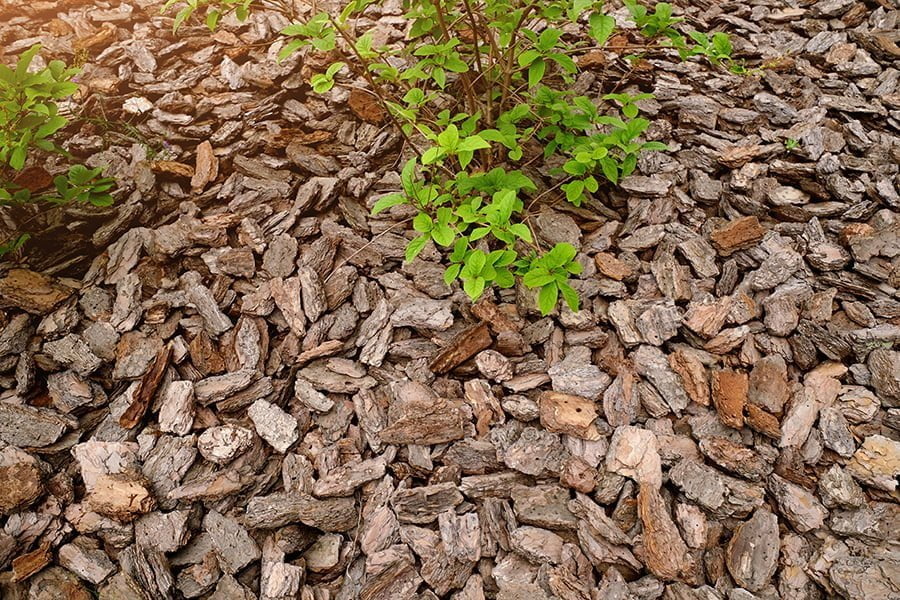
Wood chips and bark nuggets are popular mulch alternatives that can add a natural look to your garden. They are made from shredded or chipped wood, which is then spread over the soil surface.
Wood chips and bark nuggets come in different sizes, colors, and textures.
One advantage of using wood chips or bark nuggets as mulch is their ability to retain moisture in the soil by reducing evaporation. This helps plants stay hydrated for longer periods of time during hot weather conditions.
Another benefit of this mulch type is its ability to suppress weed growth by blocking sunlight from reaching weed seeds on the soil surface. This means less weeding work for you!
However, one disadvantage of using wood chips or bark nuggets as a mulching material is that they can decompose longer than other organic materials like leaves or grass clippings. As they break down slowly over time, they may not provide enough nutrients for your plants’ needs.
If you have pets such as dogs who love digging around in your garden beds looking for buried treasures (or just because it’s fun), be aware that these types of mulches may attract them due to their scent and texture.
Overall though, if you’re looking for an affordable way to add some natural beauty while also helping keep weeds at bay – consider giving wood chip/bark-nugget-based mulches a try!
Compost and Aged Manure
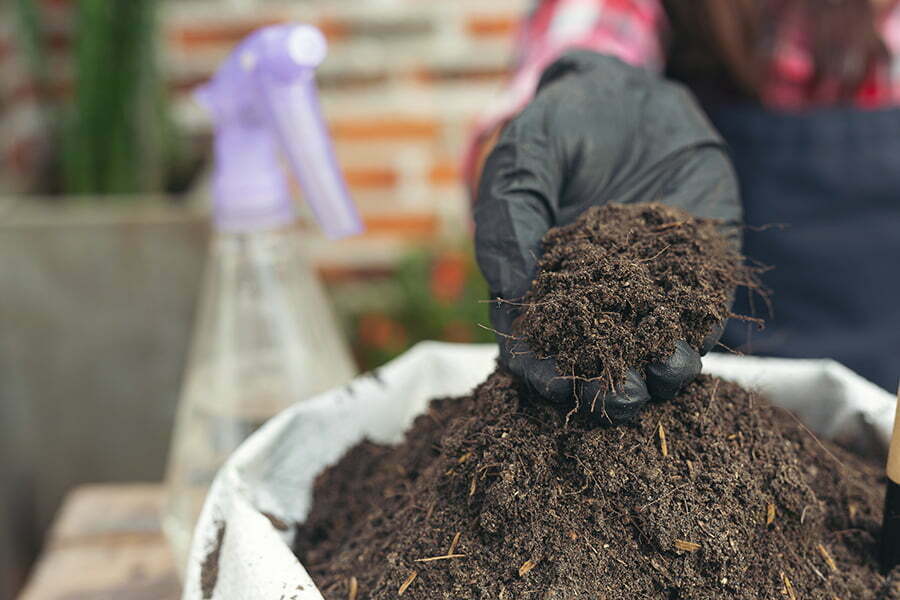
Compost and aged manure are excellent mulch alternatives that can be used in gardens to improve soil quality. Compost is made from decomposed organic matter, such as leaves, grass clippings, and food scraps.
Aged manure is also a type of compost left to decompose for several months.
One advantage of using compost or aged manure as mulch is its ability to add nutrients back into the soil. As they break down over time, they release essential minerals like nitrogen, phosphorus, and potassium which help plants grow healthier.
Another benefit of using these materials as mulch is their ability to retain moisture in the soil by reducing evaporation rates during hot weather conditions. This helps keep plant roots hydrated even when there’s little rainfall.
However, one disadvantage of using compost or aged manure as a mulching material may be its cost if you have no access to free sources nearby your garden area since it requires some effort (and sometimes money) for preparation before use compared with other types like wood chips or straw which can easily be purchased at local stores without much hassle.
Overall, if you’re looking for an eco-friendly way to enhance your garden’s health while keeping costs low, consider adding either compost or aged-manured based on availability near you!
Cardboard and Newspaper
Cardboard and newspaper are two readily available mulch alternatives that can be used in your garden. Both materials are affordable, eco-friendly, and easy to find.
Cardboard is an excellent option for suppressing weeds as it blocks sunlight from reaching the soil. It also helps retain moisture in the soil by reducing evaporation.
Cardboard is biodegradable and will eventually break down into the soil, adding organic matter to your garden bed.
Newspaper works similarly to cardboard but may not last as long due to its thinner texture. However, it’s still a great option for weed suppression and moisture retention while being environmentally friendly.
One disadvantage of using cardboard or newspaper as mulch is that they may attract pests such as slugs or snails if left too thick on top of moist soils. They might blow away easily if not secured properly with rocks or other heavy objects.
Overall both options provide an inexpensive way of keeping weeds at bay while improving overall plant health without breaking the bank!
Pebbles, Gravel, and Crushed Stone
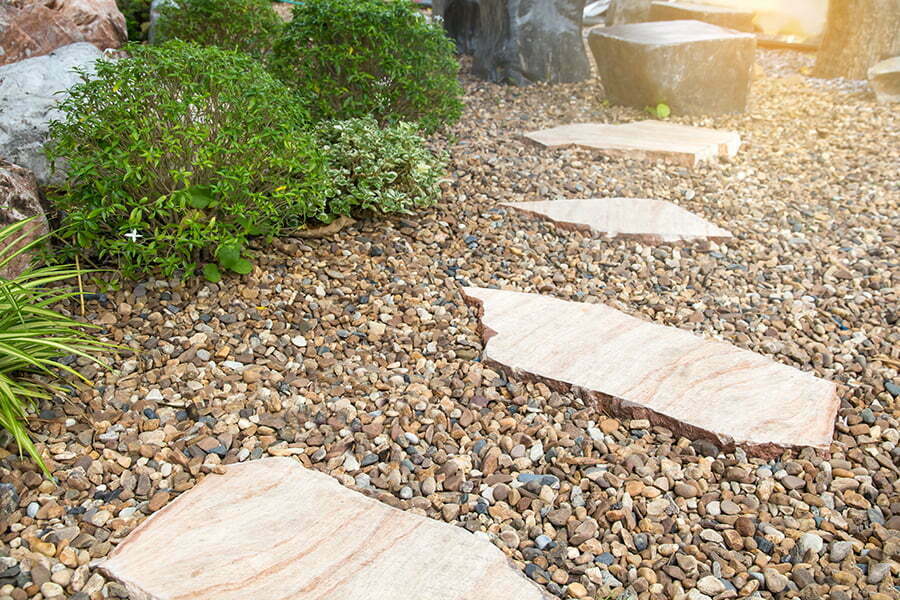
If you’re looking for a low-maintenance and long-lasting mulch alternative, pebbles, gravel, or crushed stone might be the perfect option for you. These materials are available in various sizes and colors to match your landscape design.
Advantages: One of the biggest advantages of using pebbles or gravel as mulch is that they don’t decompose like organic materials such as wood chips or leaves. This means that they won’t need to be replaced yearly, saving time and money in the long run.
These materials can help retain moisture in soil while also preventing weed growth.
Disadvantages: While pebbles/gravel/crushed stone may seem like an ideal solution at first glance, there are some downsides to consider before making a final decision. Firstly, these hard surfaces can make it difficult for plants with shallow roots systems to grow properly since water cannot penetrate through them easily.
Secondly, if not installed correctly with proper edging material around garden beds or walkways, stones may migrate into unwanted areas over time, which could cause damage if people walk barefooted on them.
When used appropriately, this type of mulching material provides an attractive look while being very durable against weathering elements such as wind erosion from heavy rains etc., making it one of our top picks!
Rubber and Recycled Tires
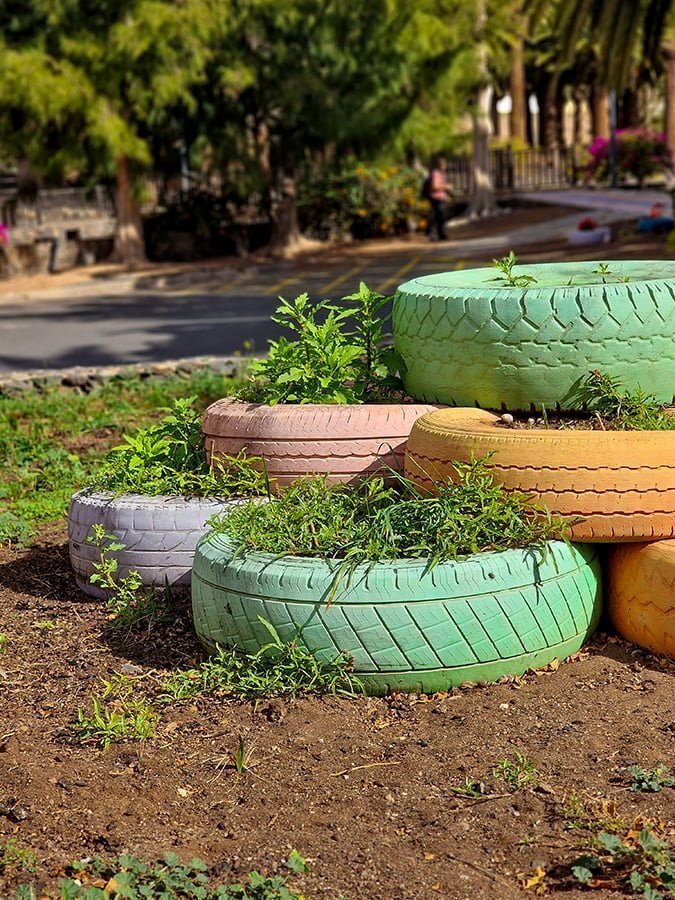
Rubber mulch, or recycled tire mulch, is a popular alternative to traditional wood-based mulch. It is made from shredded rubber tires and comes in various colors such as black, brown and red.
One of the biggest advantages of using rubber mulch is its durability – it can last for up to 10 years without needing replacement. It does not attract pests or insects like traditional wood-based options do.
However, there are some disadvantages to consider when using rubber mulch. Firstly, it can be more expensive than other organic materials used for landscaping.
Secondly, while the material itself may not decompose quickly over time due to its synthetic nature; however if any small pieces break off they will remain on your lawn indefinitely which could cause environmental concerns.
Overall though if you’re looking for a long-lasting option that requires little maintenance then recycled tire/rubber might just be what you need!
Cocoa Bean Shells
Cocoa bean shells are a popular mulch alternative that is made from the outer shell of cocoa beans. They have a rich, dark brown color, giving off a pleasant chocolate aroma when first applied.
Cocoa bean shells are an excellent choice for gardeners who want to add visual interest to their landscape while providing benefits such as weed suppression and moisture retention.
One advantage of using cocoa bean shells as mulch is that they break down slowly, so you won’t need to replace them as often. They can help deter pests like slugs and snails due to their sharp edges.
However, some disadvantages are associated with using cocoa bean shells as mulch. One major concern is that they can be toxic if ingested by pets or wildlife due to theobromine – a compound found in chocolate that can be harmful in large quantities.
Therefore it’s important not to use this type of mulch around areas where pets or children may play unsupervised.
Another potential downside is cost – cocoa bean shell mulches tend to be more expensive than other types because they’re considered more decorative than functional by many gardeners.
Overall though, if you’re looking for an attractive way to keep weeds at bay while adding some unique flair your landscaping design scheme then consider giving cocoa been shell-based alternatives serious consideration!
Sawdust and Shavings
Sawdust and shavings are another mulch alternative that can be easily found in woodworking shops or lumberyards. They are a byproduct of cutting wood, making them an eco-friendly option for reducing waste.
Advantages:
- Sawdust and shavings break down slowly, which means they will last longer than other organic mulches.
- They can help improve soil structure as they decompose, adding nutrients to the soil.
- Sawdust is also effective at suppressing weeds when applied thickly.
Disadvantages:
- Because sawdust and shavings break down slowly, they may not be suitable for plants requiring frequent fertilization or quick access to nutrients.
- When used in large quantities, sawdust can create a nitrogen deficiency in the soil due to its high carbon content. This means it’s important to mix it with other materials like compost before applying it as mulch.
- It’s also important not to use treated wood products as these contain chemicals that could harm plants or leach into the surrounding environment over time.
Sea Shells
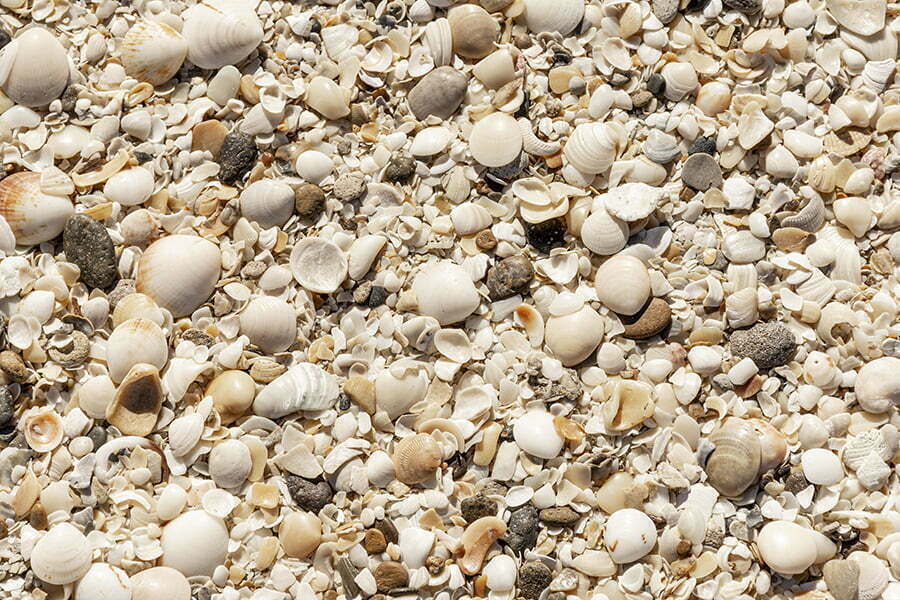
Sea shells are a unique and eco-friendly alternative to traditional mulch. They can add a coastal vibe to your garden while also providing benefits such as weed suppression, moisture retention, and soil insulation.
Sea shells come in various sizes and colors, allowing you to create different textures and patterns in your landscaping.
One disadvantage of using sea shells as mulch is that they may not be readily available in all areas. They can be more expensive than other types of mulch due to the cost of transportation from coastal regions.
However, if you live near the coast or have access to sea shell suppliers nearby, this could be an excellent option for adding character and charm to your garden while reaping traditional mulching methods’ benefits.
Coconut Coir
Coconut coir is a natural fiber extracted from the husk of coconut shells. It has become increasingly popular as a mulch alternative due to its eco-friendly and effective moisture retention.
Coconut coir also helps regulate soil temperature, making it an excellent choice for gardeners living in extreme weather conditions.
One advantage of using coconut coir as mulch is that it decomposes slowly, so you won’t have to replace it frequently. Unlike traditional wood-based mulches that can attract pests like termites and carpenter ants, coconut coir does not attract insects or rodents.
However, one disadvantage of using this type of mulch is that it may be more expensive than other alternatives such as straw or grass clippings. Also, if you are looking for a decorative option for your garden beds or landscaping projects, coconut coir may not be the best choice since its appearance can be quite plain compared to other types of organic matter used for mulching purposes.
Overall though, if you’re looking for an environmentally friendly way to retain moisture in your soil while keeping pests at bay then consider giving Coconut Coir Mulch a try!
Ground Corn Cobs
Ground corn cobs are a unique mulch alternative that can add an interesting texture to your garden beds. They are made from the woody part of corn cobs and come in different sizes, ranging from fine to coarse.
One advantage of using ground corn cobs as mulch is their ability to retain moisture in the soil, which helps plants grow better during dry spells. They decompose slowly and release nutrients into the soil over time.
However, one disadvantage of using ground corn cob as a mulch is that it may attract rodents or other pests looking for food sources. Also, if not applied correctly or too thickly on topsoil it could create an environment where weeds thrive instead of being suppressed by this type of organic matter.
Overall though if you’re looking for something unique with good water retention properties then give ground corncob a try!
Wool Waste
Wool waste is a unique and eco-friendly alternative to traditional mulch. It is made from leftover wool that cannot be used in textile production, making it an excellent option for environmentally conscious people.
Wool waste has several advantages over other types of mulch, including its ability to retain moisture and regulate soil temperature.
One of the main benefits of using wool waste as a mulch alternative is its natural ability to repel pests such as slugs and snails due to lanolin present in it. Wool fibers break down slowly over time which means you won’t have to replace your mulch frequently.
However, some disadvantages are associated with using wool waste as a mulching material. One potential drawback is that it can mat down easily when wet or compressed by foot traffic or heavy rainfalls which may hinder water penetration into the soil beneath.
If you’re looking for an eco-friendly way to keep your garden healthy while reducing landfill contributions, consider giving Wool Waste Mulching a try!
Living Groundcovers
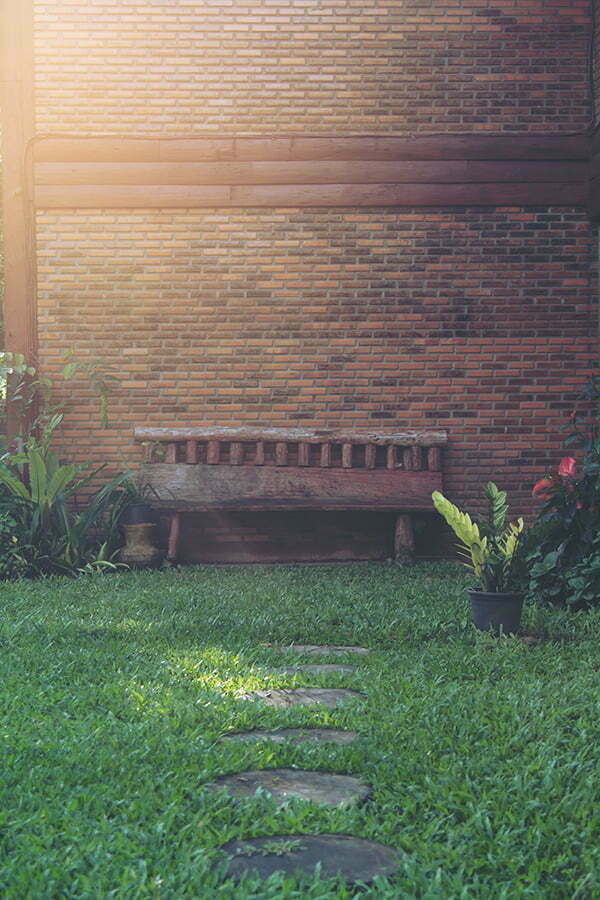
Living groundcovers are a great alternative to traditional mulch. They provide the same benefits as regular mulch, such as weed suppression and moisture retention, and add an extra layer of beauty to your garden.
Living groundcovers can be anything from low-growing plants like creeping thyme or sedum to taller options like ornamental grasses or ferns. One advantage of living groundcovers is that they require less maintenance than traditional mulch since they don’t need to be replaced yearly.
However, it’s essential to choose the right type of plant for your specific climate and soil conditions for them to thrive and provide optimal coverage. Some living groundcovers may spread too quickly and become invasive if not properly managed, so it’s essential to do research before planting them in your garden.
Green Manures and Cover Crops
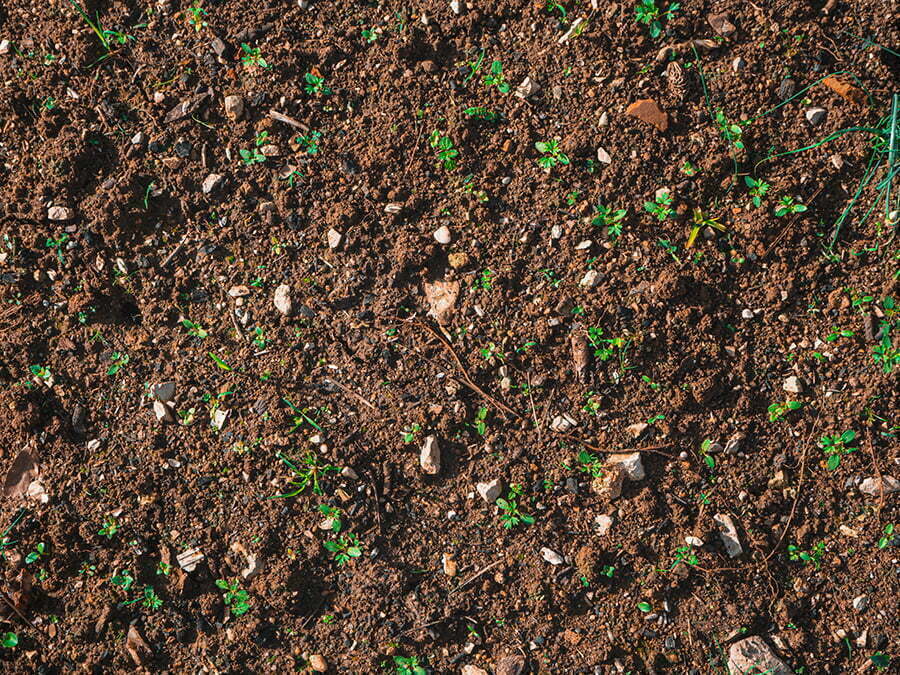
Green manures or cover crops are a great alternative to traditional mulch. They involve planting specific plants that can be grown and then tilled back into the soil, providing nutrients for future plant growth.
Some popular green manure options include clover, alfalfa, and ryegrass.
One advantage of using green manures is their ability to improve soil health by increasing organic matter content and promoting beneficial microbial activity. They can help suppress weeds and reduce erosion.
However, one disadvantage of using green manures is that they require time to grow before being tilled back into the soil, as opposed to traditional mulch, which can be applied immediately. Also, if not appropriately managed or left too long before being tilled under, it could become a weed problem.
Overall though, green manure and cover crops are excellent options for those looking for an eco-friendly way of improving their garden’s health while saving money on expensive fertilizers!
Recycled Glass
Recycled glass is a unique and eco-friendly mulch alternative that can add a pop of color to your garden. It’s made from crushed glass bottles, jars, and other recycled materials.
The most significant advantage of using recycled glass as mulch is its durability; it doesn’t break down or decompose like traditional organic mulches such as wood chips or leaves.
Another advantage of using recycled glass as mulch is that it reflects light, which can help keep the soil cool during the hot summer months. Because it doesn’t absorb water as organic matter does, you won’t have to worry about mold growth or rotting.
However, some disadvantages exist when using recycled glass as a mulching material. One major drawback is its cost; compared to other natural and synthetic materials used for landscaping purposes, such as gravel or bark chips, recycled glasses are more expensive.
Moreover, if not installed properly with the proper drainage system in place- Recycled Glass may cause problems by trapping moisture around plant roots leading them to root rot issues over time.
If you’re looking for an attractive, long-lasting option that will make your garden stand out while being environmentally friendly at the same time then recycle glass mulching could be just what you need!
Artificial Turf
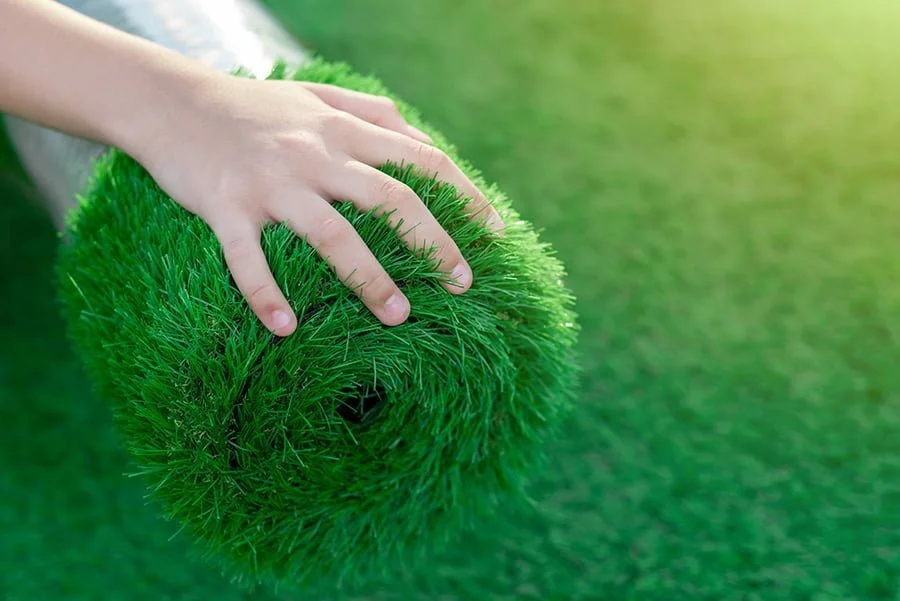
Artificial turf is a popular mulch alternative that has gained popularity in recent years. It is made of synthetic fibers that mimic the look and feel of natural grass, making it an excellent choice for those who want to maintain a green lawn without the hassle of regular maintenance.
One advantage of artificial turf as a mulch alternative is its durability. Unlike natural grass, it does not require watering or mowing, which means you can save time and money on maintenance costs.
Artificial turf stays green all year round, regardless of weather conditions.
However, there are also some disadvantages to consider when using artificial turf as mulch. One major drawback is its high upfront cost compared to other mulches, such as wood chips or gravel.
Artificial turf may also become hot during summer due to its synthetic material composition.
If you’re looking for an easy-to-maintain option with long-term benefits and don’t mind investing more upfront costs than traditional options like wood chips or gravel then artificial turfs could be worth considering!
Erosion Control Blankets
Erosion control blankets are a great alternative to traditional mulch, especially for areas that experience heavy rainfall or wind. These blankets are made of natural fibers such as straw, coconut coir, or jute and can be laid directly on top of the soil to prevent erosion.
One advantage of using erosion control blankets is their ability to provide immediate protection against soil loss. They also help retain moisture in the soil and promote healthy plant growth by providing insulation from extreme temperatures.
However, one disadvantage is that they may not be as effective in preventing weed growth as other mulch alternatives. Some erosion control blankets may break down quickly over time and require frequent replacement.
If you’re looking for an eco-friendly way to protect your garden from erosion without breaking the bank on expensive landscaping solutions like retaining walls or terracing systems – then consider using an erosion control blanket!
Recap
